 | –≠–ª–µ–∫—Ç—Ä–æ–Ω–Ω—ã–π –∫–æ–º–ø–æ–Ω–µ–Ω—Ç: SA2420 | –°–∫–∞—á–∞—Ç—å:  PDF PDF  ZIP ZIP |

Philips
Semiconductors
SA2420
Low voltage RF transceiver -- 2.45GHz
Product specification
1997 May 23
INTEGRATED CIRCUITS
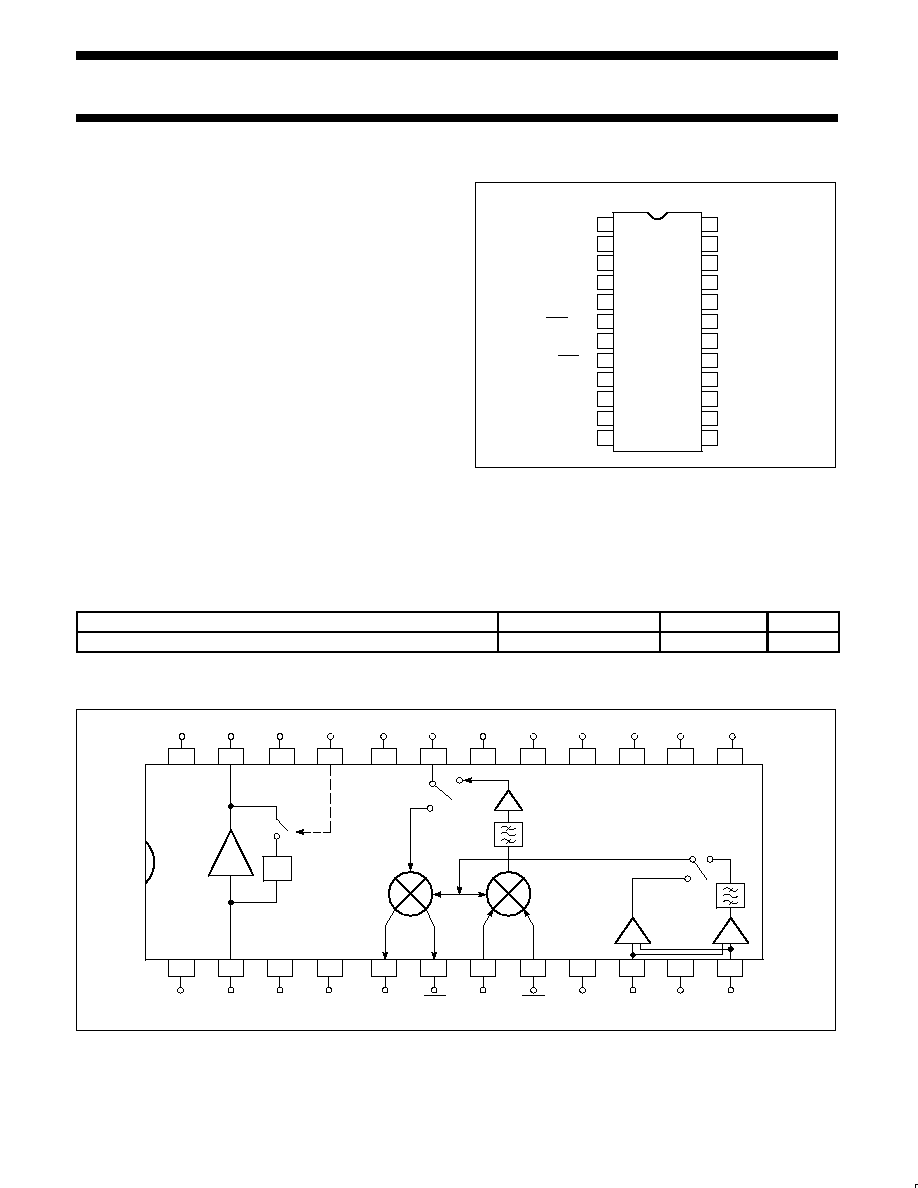
Philips Semiconductors
Product specification
SA2420
Low voltage RF transceiver -- 2.45 GHz
2
1997 May 23
853≠1984 18069
DESCRIPTION
The SA2420 transceiver is a combined low-noise amplifier, receive
mixer, transmit mixer and LO buffer IC designed for
high-performance low-power communication systems for
2.4-2.5GHz applications. The LNA has a 2.5dB noise figure at
2.45GHz with 14dB gain and an IP3 intercept of -3dBm at the input.
The gain is stabilized by on-chip compensation to vary less than
±
0.2dB over the -40 to +85
∞
C temperature range. The
wide-dynamic-range receive mixer has a 10.9dB noise figure and an
input IP3 of +2.8dBm at 2.45GHz. The nominal current drawn from
a single 3V supply is 37mA in transmit mode and 22mA in receive
mode.
FEATURES
∑
Low current consumption: 37mA nominal transmit mode and
22mA nominal receive mode
∑
Fabricated on a high volume, rugged BiCMOS technology
∑
High system power gain: 22.5dB (LNA + Mixer) at 2.45GHz
∑
TSSOP24 package
∑
Excellent gain stability versus temperature and supply voltage
∑
-10dBm LO input power can be used to drive the mixer
∑
Operates with either full or half frequency LO
∑
Wide IF range: 50≠500MHz
PIN CONFIGURATION
1
2
3
4
5
6
7
8
9
10
11
12
13
14
24
23
22
21
20
19
18
17
16
15
DH Package
ATTEN SW
Tx/Rx SW
GND
RF IN/OUT
GND
GND
GND
LNA OUT
VCC
GND
GND
Rx IF OUT
GND
LOP
LNA IN
GND
GND
Rx IF OUT
Tx IF IN
Tx IF IN
LO SW
LOM
VCC LO
CHIP EN
SR00164
Figure 1.
Pin Configuration
APPLICATIONS
∑
2.45GHz WLAN front-end (802.11, ISM)
ORDERING INFORMATION
DESCRIPTION
TEMPERATURE RANGE
ORDER CODE
DWG #
24-Pin Plastic Thin Shrink Small Outline Package (Surface-mount, TSSOP)
-40 to +85
∞
C
SA2420DH
SOT355-1
BLOCK DIAGRAM
4
3
2
1
5
24
23
22
21
20
7
6
10
9
8
19
18
17
16
15
LO
GND
LOP
GND
V
CC
RF IN/
OUT
GND
ATTEN
SW
CHIP
EN
GND
GND
LNA
OUT
SW
GND
LNA
GND
GND
12
11
14
13
LOM
LO
Tx/Rx
SW
GND
V
CC
LNA
IN
Rx IF
OUT
Rx IF
OUT
Tx IF
IN
Tx IF
IN
RX
RX
TX
BUFFER
FREQ.
DBLER
BPF
BPF
PRE-DRIVER
TX
ATTENUATOR
SR00165
X2
X1
Figure 2.
SA2420 Block Diagram

Philips Semiconductors
Product specification
SA2420
Low voltage RF transceiver -- 2.45 GHz
1997 May 23
3
ABSOLUTE MAXIMUM RATINGS
SYMBOL
PARAMETER
RATING
UNITS
V
CC
Supply voltage
-0.3 to +6
V
V
IN
Voltage applied to any pin
-0.3 to (V
CC
+ 0.3)
V
P
D
Power dissipation, T
A
= 25
∞
C (still air)
24-Pin Plastic TSSOP
555
mW
T
JMAX
Maximum operating junction temperature
150
∞
C
P
MAX
Maximum power (RF/IF/LO pins)
+20
dBm
T
STG
Storage temperature range
≠65 to +150
∞
C
NOTE:
1. Transients exceeding these conditions may damage the product.
2. Maximum dissipation is determined by the operating ambient temperature and the thermal resistance, and absolute maximum ratings may
impact product reliability
JA
: 24-Pin TSSOP
= 117
∞
C/W
3. IC is protected for ESD voltages for 2000V, excepts pins 10 and 12, which are protected up to 500V.
RECOMMENDED OPERATING CONDITIONS
SYMBOL
PARAMETER
RATING
UNITS
V
CC
Supply voltage
2.7 to 5.5
V
T
A
Operating ambient temperature range
-40 to +85
∞
C
T
J
Operating junction temperature
-40 to +105
∞
C
DC ELECTRICAL CHARACTERISTICS
V
CC
= +3V, T
A
= 25
∞
C; unless otherwise stated.
SYMBOL
PARAMETER
TEST CONDITIONS
LIMITS
UNITS
SYMBOL
PARAMETER
TEST CONDITIONS
MIN
-4
TYP
+4
MAX
UNITS
I
CCTX
Supply current, Transmit
LO mode = Hi
25
37
45
mA
I
CCRX
Supply current, Receive
LO mode = Hi
15
22
28
mA
I
CC OFF
Power down mode (Tx/Rx SW = Low)
LO mode = Hi,
LNA gain = Hi
0
10
µ
A
V
LNA-IN
LNA input voltage
Receive mode
0.855
V
I
LNA-OUT
LNA output bias current
Receive mode
4.0
mA
V
LO 2.1 GHz
LO buffer DC input voltage
LO mode = Hi
2.1
V
V
LO 1.05 GHz
LO buffer DC input voltage
LO mode = Low
2.1
V
V
TX IF
Tx Mixer input voltage
Transmit mode
1.7
V
V
TX IFB
Tx Mixer input voltage
Transmit mode
1.7
V
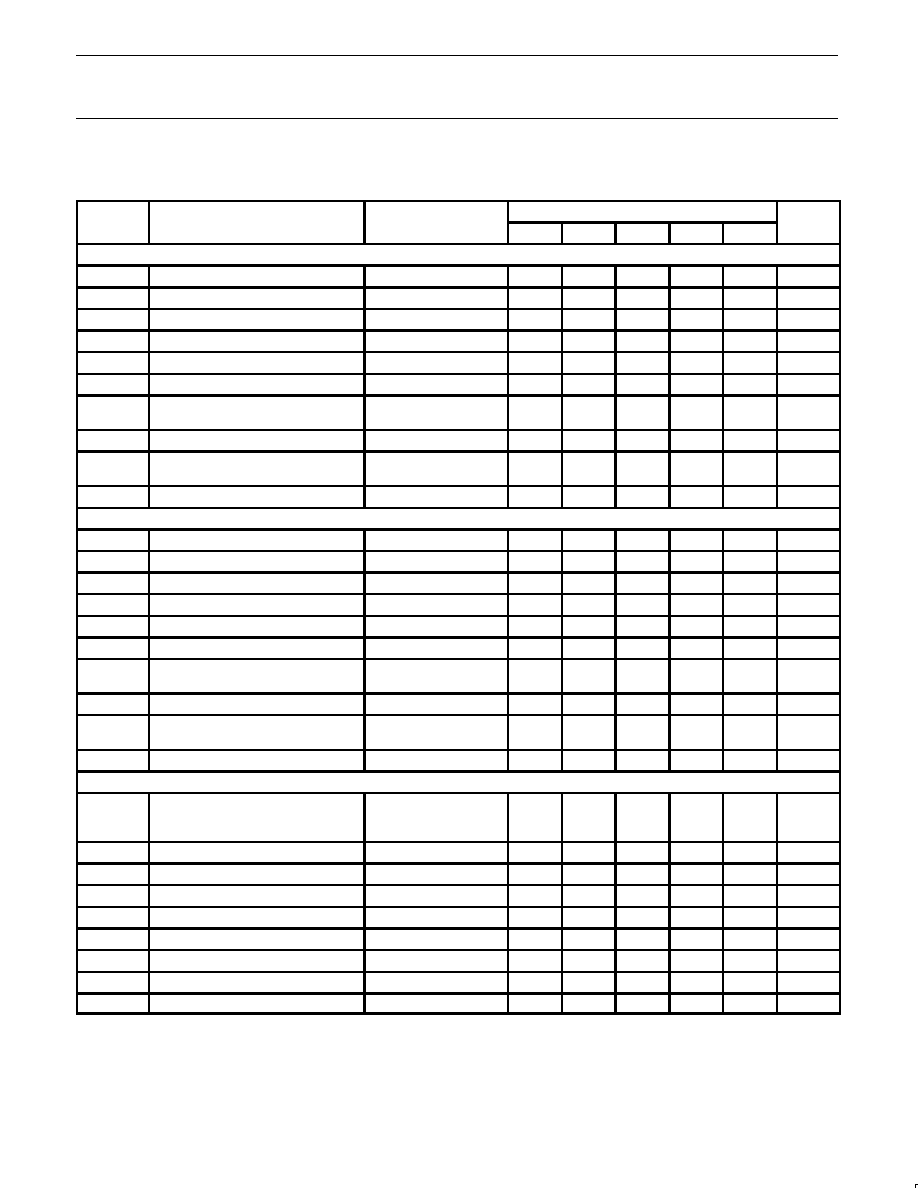
Philips Semiconductors
Product specification
SA2420
Low voltage RF transceiver -- 2.45 GHz
1997 May 23
4
AC ELECTRICAL CHARACTERISTICS
V
CC
= +3V, T
A
= 25
∞
C; LO
IN
= -10dBm @ 2.1GHz; f
RF
= 2.45GHz; unless otherwise stated.
SYMBOL
PARAMETER
TEST CONDITIONS
LIMITS
UNITS
SYMBOL
PARAMETER
TEST CONDITIONS
MIN
-4
TYP
+4
MAX
UNITS
Low Noise Amplifier (In = Pin 2; Out = 23)
S
21
Amplifier gain
LNA gain = Hi
12.7
14.0
15.3
dB
S
21
/
T
Gain temperature sensitivity
LNA gain = Hi
-0.002
dB/
∞
C
S
21
/
V
CC
Gain V
CC
drift
LNA gain = Hi
0.3
dB/V
S
12
Amplifier reverse isolation
LNA gain = Hi
-22
dB
S
11
Amplifier input match
1
LNA gain = Hi
-8
dB
S
22
Amplifier output match
1
LNA gain = Hi
-8
dB
ISO
Isolation: LO
1
to LNA
IN
LO mode = Hi,
LNA gain = Hi
-45
dB
P
-1dB
Amplifier input 1dB gain compression
LNA gain = Hi
-15
dBm
IP3
Amplifier input third order intercept
f
1
- f
2
= 1MHz,
LNA gain = Hi
-3
dBm
NF
Amplifier noise figure (50
)
LNA gain = Hi
2.3
2.5
2.7
dB
LNA High Overload Mode
S
21
Amplifier gain
LNA gain = Low
≠14.0
-13.3
≠12.0
dB
S
21
/
T
Gain temperature sensitivity
LNA gain = Low
-0.01
dB/
∞
C
S
21
/
V
CC
Gain V
CC
drift
LNA gain = Low
0.3
dB/V
S
12
Amplifier reverse isolation
LNA gain = Low
-16
dB
S
11
Amplifier input match
1
LNA gain = Low
-8
dB
S
22
Amplifier output match
1
LNA gain = Low
-8
dB
ISO
Isolation: LO
1
to LNA
IN
LO mode = Hi,
LNA gain = Low
-45
dB
P
-1dB
Amplifier input 1dB gain compression
LNA gain = Low
+6
dBm
IP3
Amplifier input third order intercept
f
1
- f
2
= 1MHz,
LNA gain = Low
17
dBm
NF
Amplifier noise figure (50
)
LNA gain = Low
17
dB
Rx Mixer (RF = Pin 19, IF = Pins 5 and 6, LO = Pin 10 or 12, P
LO
= -10dBm)
PG
C
Power conversion gain into 50
:
matched to 50
W
using external balun
circuitry.
f
S
= 2.45GHz,
f
LO
= 2.1GHz,
f
IF
= 350MHz
7.9
8.5
9.1
dB
G
C
/
T
Gain temperature drift
-0.016
dB/
∞
C
G
C
/
V
CC
Gain V
CC
drift
0.34
dB/V
S
11≠RF
Input match at RF (2.45GHz)
1
-15
dB
NF
M
SSB noise figure (2.45GHz) (50
)
10.2
10.9
11.6
dB
P
-1dB
Mixer input 1dB gain compression
≠11.4
-10.3
≠9.2
dBm
IP3
Input third order intercept
f
1
- f
2
= 1MHz
1.7
2.8
3.9
dBm
f
RF
RF frequency range
3
2.4
2.45
2.5
GHz
f
IF
IF frequency range
3
300
350
400
MHz
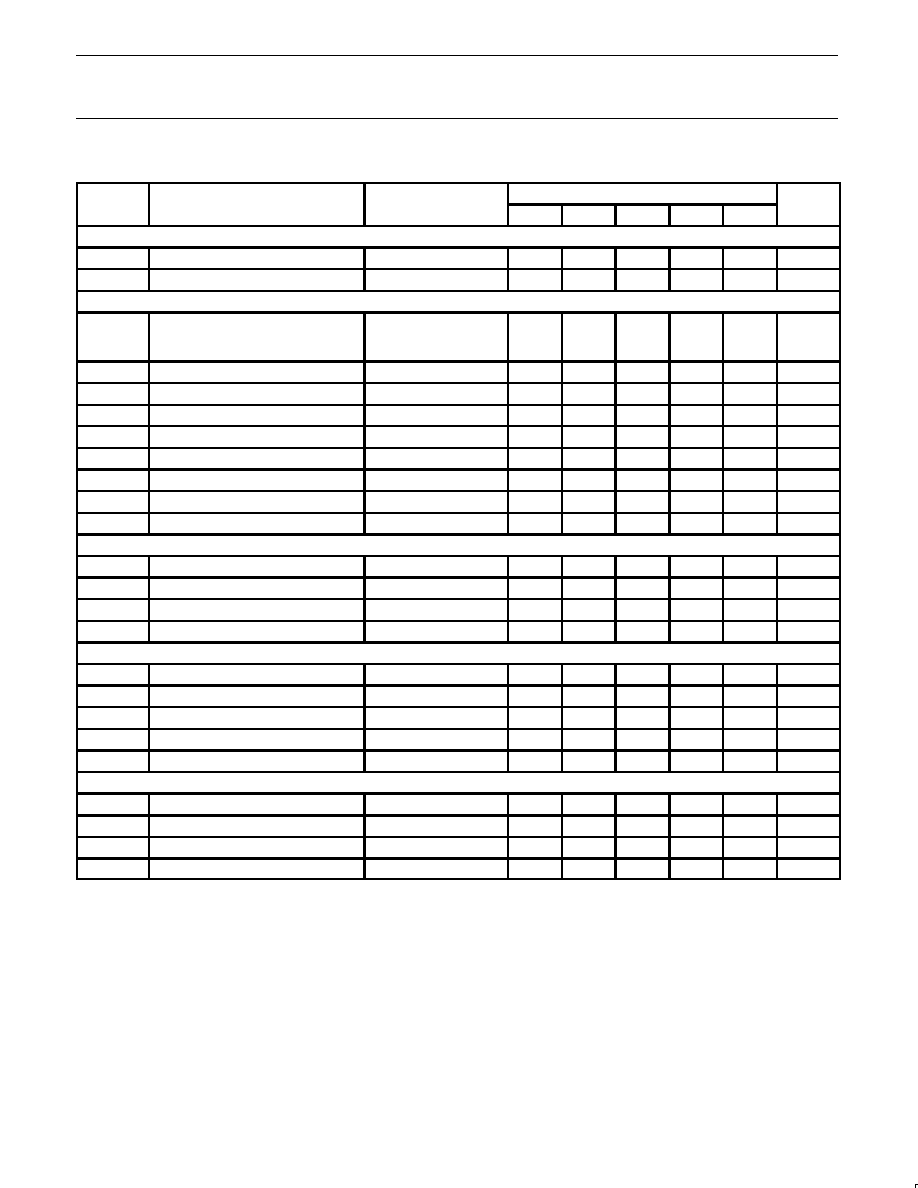
Philips Semiconductors
Product specification
SA2420
Low voltage RF transceiver -- 2.45 GHz
1997 May 23
5
AC ELECTRICAL CHARACTERISTICS (continued)
SYMBOL
PARAMETER
TEST CONDITIONS
LIMITS
UNITS
SYMBOL
PARAMETER
TEST CONDITIONS
MIN
-4
TYP
+4
MAX
UNITS
Rx Mixer Spurious Components (P
IN
= P
-1dB
)
P
RF-IF
RF feedthrough to IF
C
L
= 2pF per side
-35
dBc
P
LO-IF
LO feedthrough to IF
C
L
= 2pF per side
-35
dBc
Tx Mixer (RF = Pin 19, IF = Pins 7 and 8, LO = Pin 10 or 12, P
LO
= -10dBm)
PG
C
Power conversion gain: R
L
= 50
R
S
= 50
f
S
= 2.45GHz,
f
LO
= 2.1GHz,
f
IF
= 350MHz
15.0
17
19.9
dB
G
C
/
T
Gain temperature drift
-0.032
dB/
∞
C
G
C
/
V
CC
Gain voltage drift
0.4
dB/V
S
11≠RF
Output match at RF (2.45GHz)
1
-10
dB
NF
M
SSB noise figure (2.45GHz) (50
)
13.2
dB
P
-1dB
Output 1dB gain compression
1.5
2.9
4.3
dBm
IP3
Output third order intercept
f
1
- f
2
= 1MHz
10.1
+11.5
12.9
dBm
f
RF
RF frequency range
3
2.4
2.45
2.5
GHz
f
IF
IF frequency range
3
300
350
400
MHz
Tx Mixer Spurious Components (P
OUT
= P
-1dB
)
P
IF-RF
IF feedthrough to RF
-29
dBc
P
LO-RF
LO feedthrough to RF
-20
dBc
P
2LO-RF
2*LO feedthrough to RF
-25
dBc
P
IMAGE-RF
Image feedthrough to RF
-0
dBc
LO Buffer: Full and Half Frequency inputs
P
LO
LO drive level (see figure 16)
-10
-7
5
dBm
S
11-LO1
Mixer input match (LO = 2.1GHz)
LO mode = Hi
-10
dB
S
11-LO2
Mixer input match (LO = 1.05GHz)
LO mode = Low
-10
dB
f
LO2G
LO2G frequency range
3
LO mode = Hi
1.9
2.1
2.3
GHz
f
LO1G
LO1G frequency range
3
LO mode = Low
0.85
1.05
1.25
GHz
Switching
2
t
Rx-Tx
Receive-to-transmit switching time
1
µ
s
t
Tx-Rx
Transmit-to-Receive switching time
1
µ
s
t
POWER UP
Chip enable time
1
µ
s
t
PWR DWN
Chip disable time
1
µ
s
NOTES:
1. With simple external matching
2. With 50pF coupling capacitors on all RF and IF parts
3. This part has been optimized for the frequency range at 2.4≠2.5 GHz. Operation outside this frequency range may yield performance other
than specified in this datasheet.

Philips Semiconductors
Product specification
SA2420
Low voltage RF transceiver -- 2.45 GHz
1997 May 23
6
Table 1.
Truth Table
Chip-En
TxRx-SW
LNA-SW
LO-SW
Mode
LNA Gain
LO Freq. (Typ)
0
X
X
X
Sleep
N/S
N/S
1
0
1
1
Receive
+14dB
2.1GHz
1
0
0
1
Receive
-8dB
2.1GHz
1
0
1
0
Receive
+14dB
1.05GHz
1
0
0
0
Receive
-8dB
1.05GHz
1
1
X
1
Transmit
N/S
2.1GHz
1
1
X
0
Transmit
N/S
1.05GHz
FUNCTIONAL DESCRIPTION
The SA2420 is a 2.45GHz transceiver front-end available in the
TSSOP-24 package. This integrated circuit (IC) consists of a low
noise amplifier (LNA) and up- and down-converters. The injection of
the local oscillator (LO) signal has two options: 1) direct injection of
the LO signal at approximately 2GHz, or 2) injection of an LO signal
at approximately 1GHz through an on-chip doubler. The SA2420
functions with a supply voltage range of 3 ≠ 5 V (nominally). There
is an enable/disable switch available to power up/down the entire
chip in 1
µ
s, typically. This transceiver has several unique features.
The LNA has two operating modes: 1) high gain mode with a gain =
+14dB; and 2) low gain mode with a gain <-10dB. The switch for
this option is internal and is controlled externally by high and low
logic to the pin. When the LNA is switched into the attenuation
mode, active matching circuitry (on-chip) is switched in (reducing the
number of off-chip components required). To reduce power
consumption when the chip is transmitting, the LNA is automatically
switched into a "sleep" mode (internally) without the use of external
circuitry.
The up and down frequency converters are single-ended at the RF
port of the mixers. The up and down converters share the same
(RF) pin and use an internal switch for transmitting (up-converting)
or receiving (down-converting) modes. The switch is controlled
externally by high and low logic states. The RF port is matched to
50
and has an input IP3 of +2.8dBm (mixer only). The
down-convert mixer is buffered and has open collectors at the pins
to allow for matching to common SAW filters. The up-convert mixer
has differential inputs (IF port) and single-ended output (RF port),
with an input pin to output pin gain of 17dB. The output of the
up-converter is designed for a power level = +3dBm (P
-1dB
). The
mixers are fed by the two LO options.
The available LO options are: direct injection (2.1GHz at the pin) or
through an on-chip doubler. The doubler has a simple LC bandpass
filter (internal) at its output which passes the second harmonic to the
mixers. Through an internal switch (controlled externally), either LO
can be used depending on the designer's application. If an
application requires the use of a 1.05GHz VCO, then the doubler
option would be used to double the frequency (2
◊
1.05GHz =
2.1GHz) before being injected into the mixers. For a 2.1GHz VCO,
the direct option would be used. With this option, the signal passes
through an on-chip buffer and is then injected into the mixers.
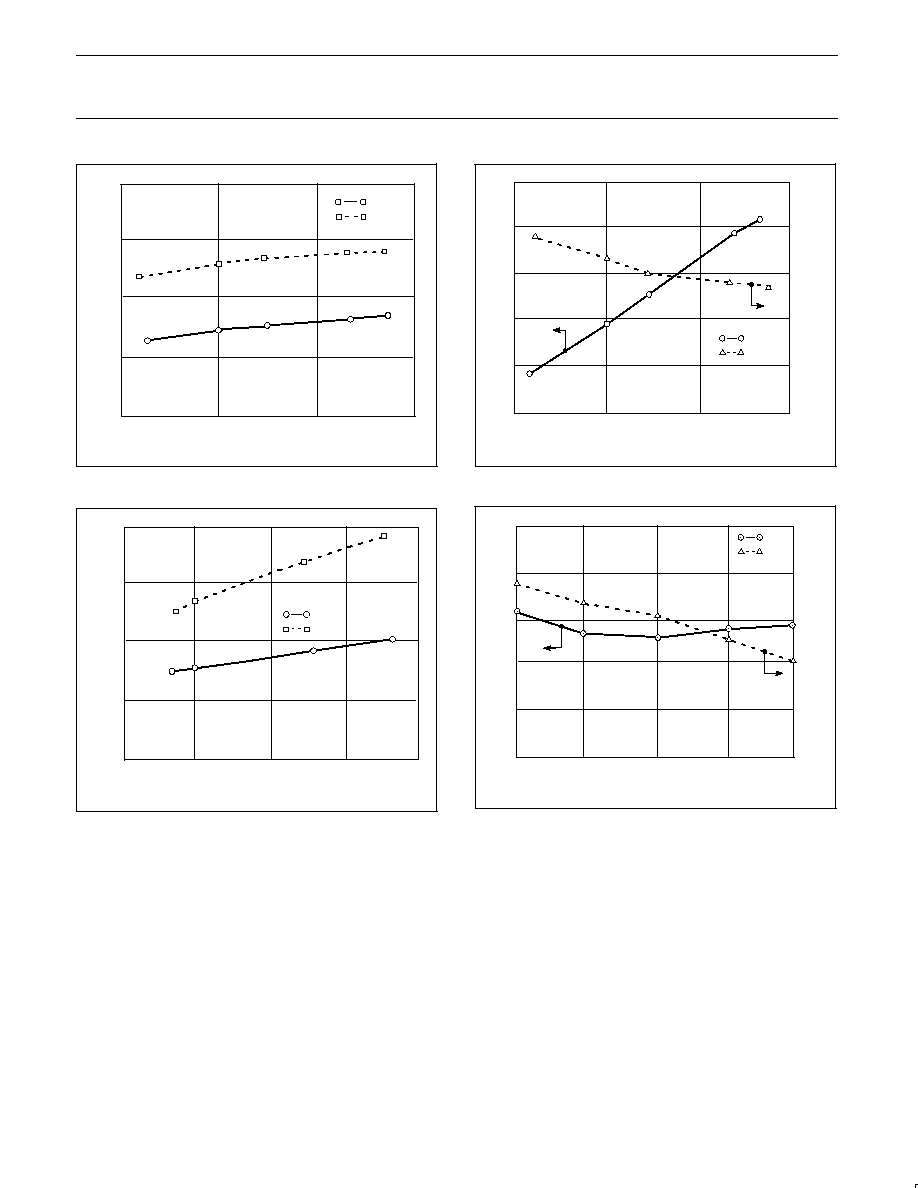
Philips Semiconductors
Product specification
SA2420
Low voltage RF transceiver -- 2.45 GHz
1997 May 23
7
TEMPERATURE (
∞
C)
≠50
0
50
10
20
30
40
50
100
CURRENT
(mA)
R
T
X
X
SR01458
V
cc
= 3V
Figure 3.
Rx & Tx Currents VS Temperature
SR01459
VOLTS (V)
2
3
5
10
20
30
40
50
6
CURRENT
(mA)
R
T
X
X
4
T = 25
∞
C
Figure 4.
Rx & Tx Currents VS Voltage Supply
SR01460
TEMPERATURE (
∞
C)
≠50
0
50
2.0
2.4
2.6
2.8
3.0
100
NOISE FIGURE (dB)
NF
GAIN
GAIN (dB)
2.2
12.8
13.6
14.0
14.4
14.8
13.2
V
cc
= 3V
Figure 5.
LNA Gain & 50
W
NF VS Temperature
SR01461
FREQUENCY (GHz)
2.400
2.425
2.450
2.0
2.4
2.6
2.8
3.0
2.475
NOISE FIGURE (dB)
NF
GAIN
GAIN (dB)
2.2
2.500
12.8
13.6
14.0
14.4
14.8
13.2
V
cc
= 3V
Figure 6.
LNA Gain & 50
W
NF VS Frequency

Philips Semiconductors
Product specification
SA2420
Low voltage RF transceiver -- 2.45 GHz
1997 May 23
8
SR01462
VOLTS (V)
2
3
4
2.0
2.4
2.6
2.8
3.0
5
NOISE FIGURE (dB)
NF
GAIN
GAIN (dB)
2.2
6
13
15
16
17
18
14
T = 25
∞
C
Figure 7.
LNA Gain & 50
W
NF VS Supply Voltage
SR01463
FREQUENCY (GHz)
2.400
2.425
2.450
≠14.0
≠13.2
≠12.8
≠12.4
≠12.0
2.475
S21 LOSS (dB)
LOSS
S12
S12(dB)
≠13.6
2.500
≠27.0
≠25.4
≠24.6
≠23.8
≠23.0
≠26.2
T = 25
∞
C
V
cc
= 3V
Figure 8.
LNA Loss Mode & S12 VS Frequency
SR01464
VOLTS (V)
2
3
4
≠20
≠15
≠10
≠5
0
5
INPUT
IP3
AND 1 dB GAIN COMPRESSION (dBm)
P≠1dB
IP3
6
T = 25
∞
C
Figure 9.
LNA Input IP3 and P≠1dB VS Supply Voltage
SR01465
FREQUENCY (GHz)
2.400
2.425
2.450
≠20
≠15
≠10
≠5
0
2.475
Input IP3 and 1 dB Gain compression (dBm)
P≠1dB
IP3
2.500
V
cc
= 3V
T = 25
∞
C
Figure 10.
LNA Input IP3 and P≠1dB VS Frequency

Philips Semiconductors
Product specification
SA2420
Low voltage RF transceiver -- 2.45 GHz
1997 May 23
9
SR01466
VOLTS (V)
2
3
4
0
5
10
15
20
5
LNA
LOSS MDOE INPUT
IP3
AND P≠1dB (dBm)
P≠1dB
IP3
6
T = 25
∞
C
Figure 11.
LNA Loss Mode Input IP3 and P≠1dB VS Voltage
SR01467
TEMPERATURE (
∞
C)
≠50
0
9.0
10.6
11.4
11.8
50
SSB NOISE FIGURE (dB)
NF
GAIN
CONVERSION GAIN (dB)
100
7.0
8.2
8.6
7.4
11.0
10.2
9.8
9.4
7.8
9.0
9.4
9.8
V
CC
= 3V
Figure 12.
Rx Mixer Conv. Gain & SSB NF VS Temperature
SR01468
VOLT (V)
2
3
4
10.5
10.9
11.1
11.3
11.5
5
SSB NOISE FIGURE (dB)
NF
GAIN
CONVERSION GAIN (dB)
10.7
6
8.0
8.8
9.2
9.6
10.0
8.4
T = 25
∞
C
Figure 13.
Rx Mixer Conv. Gain & SSB NF VS Supply Voltage
SR01469
VOLTS (V)
2
3
4
≠10
≠5
0
5
5
INPUT
IP3
AND 1 dB GAIN COMPRESSION (dBm)
P≠1dB
IP3
6
T = 25
∞
C
Figure 14.
Rx Mixer Input IP3 and P≠1dB VS Supply Voltage

Philips Semiconductors
Product specification
SA2420
Low voltage RF transceiver -- 2.45 GHz
1997 May 23
10
SR01470
FREQUENCY (GHz)
2.400
2.425
2.450
≠10
≠5
0
5
2.475
INPUT
IP3
AND 1 dB GAIN COMPRESSION (dBm)
P≠1dB
IP3
2.500
V
CC =
3V
T = 25
∞
C
Figure 15.
Rx Mixer Output IP3 and P≠1dB VS Frequency
SR01471
LO POWER (dBM)
≠30
≠24
≠18
≠10
≠5
5
10
≠12
Rx MIXER CONVERSION GAIN (dB)
0
0
≠6
FULL (LO = 2.1 GHZ)
DOUBLER (LO = 1.05 GHZ
Figure 16.
Rx Mixer Conversion Gain VS LO Power
SR01472
TEMPERATURE (
∞
C)
≠50
0
50
16
18
20
22
100
CURRENT
(mA)
GAIN
POWER
≠6
0
6
12
SA
TURA
TED
OUTPUT
POWER (dB)
V
CC
= 3V
Figure 17.
Tx Mx conv. Gain and Output Pwr VS Temp.
SR01473
LO POWER (dBM)
≠30
≠20
≠30
≠18
≠6
0
≠10
LO
AND IMAGE SUPPRESSION (dbc)
LO
IMAGE
0
≠12
≠24
Figure 18.
Tx Mixer LO and Image Suppression

Philips Semiconductors
Product specification
SA2420
Low voltage RF transceiver -- 2.45 GHz
1997 May 23
11
SR01474
VOLTS (V)
2
3
12.8
13.2
13.6
13.8
5
SSB NOISE FIGURE (dB)
6
13.4
CONVERSION GAIN (dB)
13.0
18.0
19.2
20.4
21.0
19.8
18.6
4
NF
GAIN
T = 25
∞
C
Figure 19.
Tx Mixer Gain & NF VS Supply Voltage
SR01475
VOLTS (V)
2
3
0
10
15
5
OUTPUT P≠1dB
AND IP3 (dBM)
P≠1dB
IP3
6
5
4
T = 25
∞
C
Figure 20.
Tx Mixer Output P≠1dB and IP3 Vs Voltage
SR01479
TEMPERATURE (
∞
C)
≠50
0
≠2
10
16
100
OUTPUT
IP3
AND 1 dB GAIN COMPRESSION (dBm)
P≠1dB
IP3
4
50
V
CC
= 3V
Figure 21.
Tx Mixer Output IP3 and P≠1dB VS Temperature
SR01480
FREQUENCY (GHz)
2.400
2.425
0
9
12
2.475
OUTPUT
IP3
AND 1 DB GAIN COMPRESSION (dBm)
P≠1dB
IP3
2.500
6
2.450
3
V
CC
= 3V
T = 25
∞
C
Figure 22.
Tx Mixer Output IP3 and P≠1dB VS Frequency

Philips Semiconductors
Product specification
SA2420
Low voltage RF transceiver -- 2.45 GHz
1997 May 23
12
GND
LNA
IN
GND
GND
Rx IF OUT
Rx IF OUT
Tx IF IN
Tx IF IN
GND
LOP
LO SW
LOM
V
LNA
OUT
GND
GND
A
TTEN SW
RF I/O
GND
Tx/Rx SW
GND
GND
ENABLE
CC
V
CC
1
2
3
4
5
6
7
8
9
10
11
12
24
23
22
21
20
19
18
17
16
15
14
13
145
V
+
CC
260
SW5
V
CC
C18
C15
1.5pF
LNA
OUT
RF I/O
C14
33pF
C13
1.5pF
L4
100nH
SW4
SW3
C1
1
33pF
C12
100nF
SW2
C16
100nF
C17
10uF
C2
C1
1.5pF
LNA
IN
1.5pF
V
CC
300
300
300
300
C5
10pF
TxIN
C4
3.3pF
L1
47nH
C3
10pF
L2
27nH
C6
100pF
C8
10pF
C7
10pF
L3
33nH
SW1
V CC
GND
L0
C10
33pF
R1
50
C9
33pF
U1
V
CC
200
LO
SA2420
2.45 GHz LOW VOL
T
AGE
RF TRANSCEIVER
XXX
: 10 MILS WIDE, XXX MILS LONG ON 31 MILS
THICK OF NA
TURAL
FR≠4
SUBSTRA
TE
SR01481
RxOUT
(not used)
(352 MHz)
(352 MHz)
W
Figure 23.
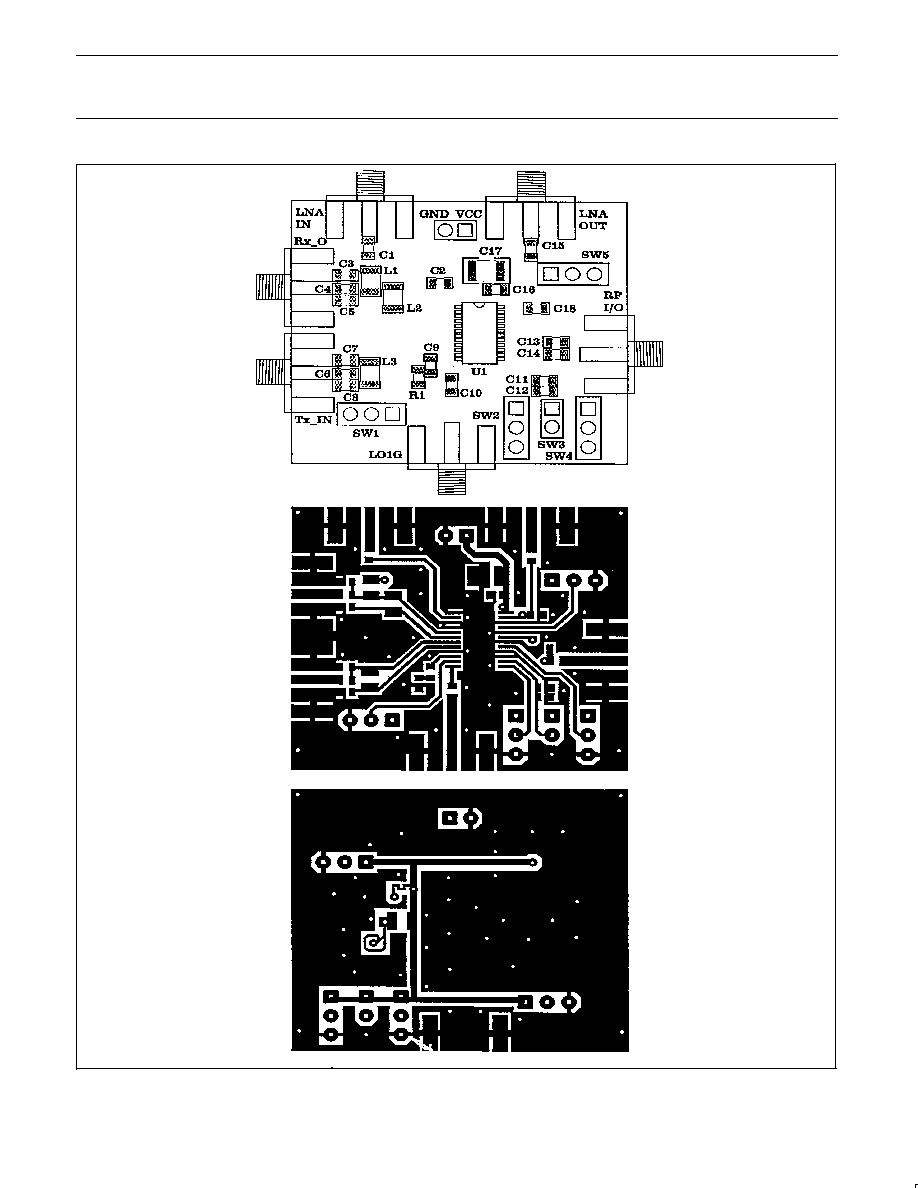
Philips Semiconductors
Product specification
SA2420
Low voltage RF transceiver -- 2.45 GHz
1997 May 23
13
SR01485
Figure 24.
SA2420 RF Transciever
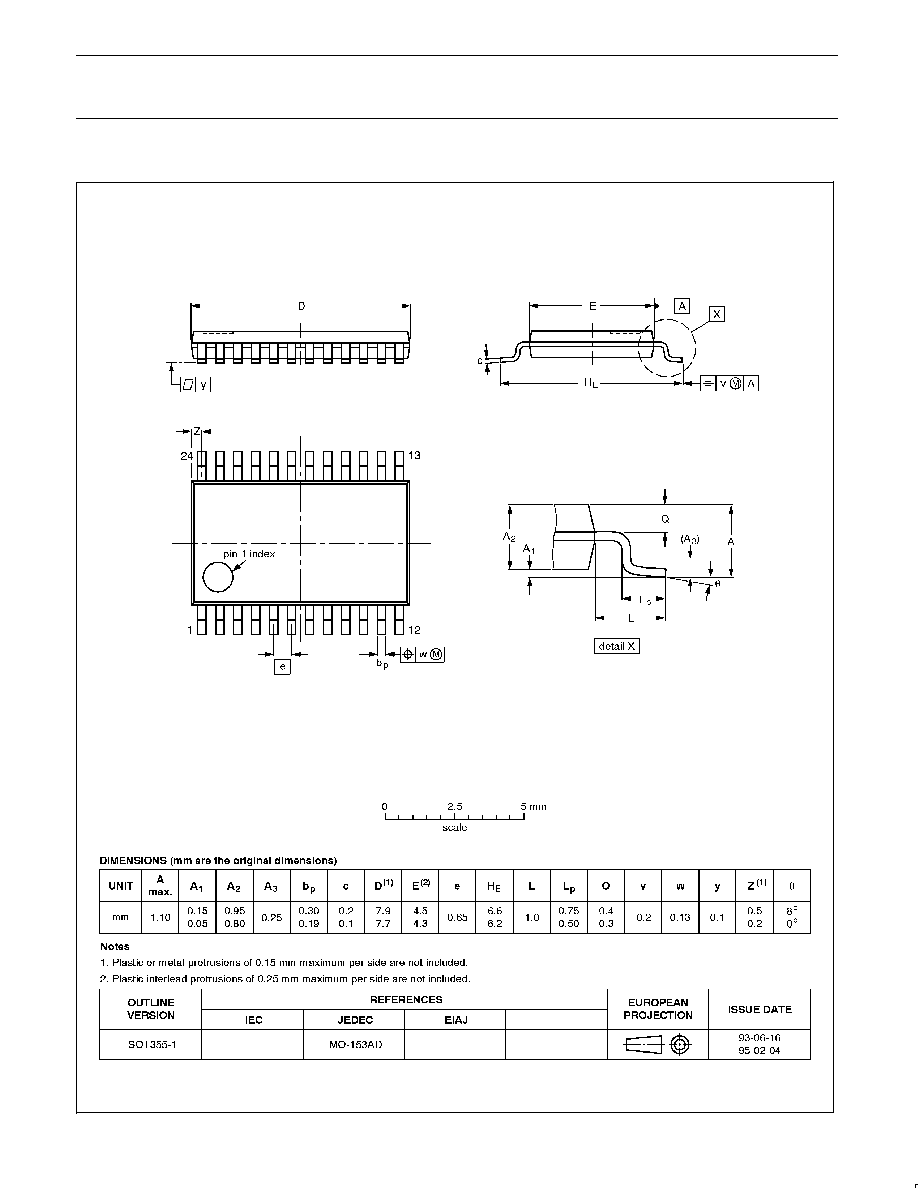
Philips Semiconductors
Product specification
SA2420
Low voltage RF transceiver -- 2.45GHz
1997 May 23
14
TSSOP24:
plastic thin shrink small outline package; 24 leads; body width 4.4 mm
SOT355-1

Philips Semiconductors
Product specification
SA2420
Low voltage RF transceiver -- 2.45GHz
1997 May 23
15
NOTES

Philips Semiconductors
Product specification
SA2420
Low voltage RF transceiver -- 2.45GHz
1997 May 23
16
Philips Semiconductors and Philips Electronics North America Corporation reserve the right to make changes, without notice, in the products,
including circuits, standard cells, and/or software, described or contained herein in order to improve design and/or performance. Philips
Semiconductors assumes no responsibility or liability for the use of any of these products, conveys no license or title under any patent, copyright,
or mask work right to these products, and makes no representations or warranties that these products are free from patent, copyright, or mask
work right infringement, unless otherwise specified. Applications that are described herein for any of these products are for illustrative purposes
only. Philips Semiconductors makes no representation or warranty that such applications will be suitable for the specified use without further testing
or modification.
LIFE SUPPORT APPLICATIONS
Philips Semiconductors and Philips Electronics North America Corporation Products are not designed for use in life support appliances, devices,
or systems where malfunction of a Philips Semiconductors and Philips Electronics North America Corporation Product can reasonably be expected
to result in a personal injury. Philips Semiconductors and Philips Electronics North America Corporation customers using or selling Philips
Semiconductors and Philips Electronics North America Corporation Products for use in such applications do so at their own risk and agree to fully
indemnify Philips Semiconductors and Philips Electronics North America Corporation for any damages resulting from such improper use or sale.
This data sheet contains preliminary data, and supplementary data will be published at a later date. Philips
Semiconductors reserves the right to make changes at any time without notice in order to improve design
and supply the best possible product.
Philips Semiconductors
811 East Arques Avenue
P.O. Box 3409
Sunnyvale, California 94088≠3409
Telephone 800-234-7381
DEFINITIONS
Data Sheet Identification
Product Status
Definition
Objective Specification
Preliminary Specification
Product Specification
Formative or in Design
Preproduction Product
Full Production
This data sheet contains the design target or goal specifications for product development. Specifications
may change in any manner without notice.
This data sheet contains Final Specifications. Philips Semiconductors reserves the right to make changes
at any time without notice, in order to improve design and supply the best possible product.
Date of release: 05≠97
Document order number:
9397 750 03302
Philips
Semiconductors















